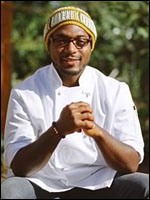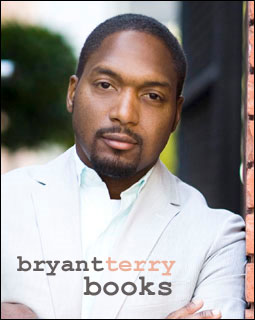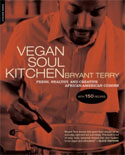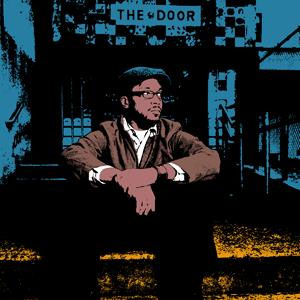Eco-chef and Food Activist, Bryant Terry

Bryant Terry is a nationally recognized eco chef, author, and food justice activist. He is currently a Food and Society Policy Fellow, a national program of the WK Kellogg Foundation. His passion for grub can be traced back to his childhood in Memphis, Tennessee where his grandparents inspired him to grow, cook, and appreciate food.
In 2001, Bryant founded b-healthy! (Build Healthy Eating and Lifestyles to Help Youth), a five-year initiative created to raise awareness about food justice issues and empower youth to be active in creating a more just and sustainable food system.
Bryant's work and recipes have been featured in Gourmet, Food and Wine, The San Francisco Chronicle, Vibe, Domino, and many other publications. Bryant has received numerous awards for his work, which include an Award for Excellence in Health-Supportive Food Education (Natural Gourmet Institute), an Open Society Institute Community Fellowship (Soros Foundation), a Wave of the Future Award (Glynwood Center), and a Sea Change Residency (Gaea Foundation).
Called "ingenious" by The New York Times Magazine, his critically acclaimed first book, Grub: Ideas for an Urban Organic Kitchen (Tarcher/Penguin, 2006) with co-author Anna Lappé, is a winner of the 2007 Nautilus Book Award. Since Grub's publication, Bryant has traveled the country speaking and doing cooking demonstrations at bookstores, farmers markets, co-ops, churches, clubs, cafes and over a dozen universities, including Stanford University, Columbia University, and New York University.
Bryant has made dozens of national radio and television appearances including being a guest chef on three episodes of the BET series "My Two Cents" and an expert commentator on the Sundance Channel's original series "Big Ideas for a Small Planet." Bryant is also a host on "The Endless Feast," a 13-episode PBS series that explores the connection between the earth and the food on our plates.
Bryant is a consultant for the Bioneers Conference, the People's Grocery, and other not-for-profit organizations as well as corporations. He is also on the advisory board of the "Nourish: Food + Community" film and educational project.
Bryant graduated from the Chef's Training Program at the Natural Gourmet Institute for Health and Culinary Arts in New York City. He holds an M.A. in History from New York University and a B.A. with honors in English from Xavier University of Louisiana. He recently moved from New York City to the Bay Area. Bryant's is currently working on two books: Organic Soul, which will be published by Da Capo/Perseus in 2009 and Conscious Cooking, which will be published by Parallax Press in 2010.
www.eatgrub.org | www.bryant-terry.com
He’s where Brooklyn cool meets Oakland fresh...
Bryant Terry is onto something that will definitely capture your imagination and it will demands that you pay close attention. He’s got a message that will go straight to your senses and will hopefully strike an urgent chord with your sensibilities. Bryant brings culture to food and he takes food the level of a serious conversation about sustainability and good health. I am convinced that it is as a result of his genuine passion that he does it all with ease...
DR: Tell me about your life and about your work.
BT: It is really important to me not to identify myself, solely through my work.
The most important thing to me right now is my spiritual development. The primary vehicle that I use right now to continue developing my spiritually is Buddhism. I practice in the Zen Buddhast tradition passed down by Thich Nhat Hanh; engaged Buddhism, in which we value the three jewels of Buddhism - the Buddha, the Dharma and the Sangha. We are living in a world where there are real issues that need to be attended to. There are people who are being present and conscious to a lot of these issues. We should be engaged in figuring out ways that we can contribute to the positive development of this world. That is why I am drawn to that particular tradition.
Active meditation is very important to me. It helps to center me and helps to keep me grounded and focused on what is important. Meditation also allows me to be in this space that no one else can enter.
I get a lot of information when I meditate. I attribute so much of the content in Grub, my first book, to my mediation practice. There are times when I read the book and wonder where all of the information came from. When I meditate information just flows. When I am spiritually grounded, everything just flows.
The thing about the work that I am doing right now is that, more than just being work, it is what I am doing in the world. It is what I love to do and I don't see it as a chore.
My decision to attend the Natural Gourmet Institute for Cooking and Health, which is where I did my training, wasn't driven by the desires that my parents had for me to make a lot of money nor was it driven by my own perceptions of what I needed to do to be smart and successful. The decision evolved out of this deep longing in my soul to do work that honored my ancestors, to do work that would create a better way for my children, to do work that would allow me to express myself artistically and to do work that just fed people.
DR: How is your work actually fulfilling that longing in you?
BT: I am a chef.
When people hear that, the first thing that they ask is "What restaurant do you work at?" I don't work at a restaurant. The title that people use to describe what I do is Eco-chef, author and food justice activist. I am active around food, health and farming issues. Right now, cooking and writing are the primary vehicles through which I am doing my work. I am working on a new book and I am constantly contributing to magazines and just having dinner parties so that I can cook good food for people.
I have always said that, more than writing books, more than lectures or workshops, the way that I have helped to shift people's consciousness about food is by making them a good meal. By going to the farmers market or going to a food co-op and getting local and seasonal organic food and actually demonstrating how good it can be, the barriers that people automatically have fall away. People have these perceptions - healthy must mean it is going to taste bland, or that healthy food will be expensive or hard to get a hold of -- all of these different perceptions prevent people from really engaging with food. I use the kitchen and feeding people as a way to get them to realize what they didn't know.
For instance -
If you get food that is from the farmers market it is going to taste even better because it hasn't been sitting in a warehouse for six months and shipped across the country. The real flavor is in the freshness and not in all of the accoutrement that people put in and on top of food.
DR: There is something really special and empowering about getting to know the farmer and what and how he grows his food. It really does connect you with what it is you're eating and puts you much more in control of your health and well being.
BT: I always tell people that, more than the health benefits that you get by supporting this type of healthy sustainable food system that a lot of people are working toward now, you are meeting the person that is growing your food and spending your money directly with that person and ensuring that they get the most from it. When farmers are selling their products to a conventional grocery store or even some of the corporate health food stores, they are not getting a lot of the money that their food is being sold for. I have talked to farmers that are telling me that they are selling their foods to an unnamed corporate that is selling the food for, let's say $2.00 a pound and the store is selling the food for $5.00 a pound. So the corporation is making this huge profit and the farmer isn't getting the most for his product. If you go to the farmers market they are getting 90 cents on the dollar for every dollar that you spend and your money is not going to a corporate headquarters that is far away from you.
When you spend your money with a farmer or a food co-op, that money is circulating through the community and it has this multiplier effect.
And, there are so many benefits besides the health benefits - the environmental and ecological benefits, the community benefits and economical benefits make eating local seasonal, sustainable food worth it for everybody.
DR: I am really interested in knowing about what it is like for you, as someone who has pursued doing work that would, not only be meaningful to you, but would somehow be responsible for providing something valuable to the world. What does that feel like?
40 People who are redefining Green
Chef and activist Bryant Terry, 36, works to make our food system just and sustainable, and, in his own words, "illuminate the intersections between poverty, structural racism, and food insecurity." He's reminded people of the healthy origins of African-American cuisine in Vegan Soul Kitchen: Fresh, Healthy, and Creative African American Cuisine. He's also working on the Southern Organic Kitchen Project, which aims to inspire healthier eating in urban communities in the South. In 2006, he coauthored Grub: Ideas for an Urban Organic Kitchen with Anna Lappé and started an online Grub hub to promote healthy eating. These days, he talks to communities around the country about healthy eating and sustainable food systems, and contributes to a number of food-focused TV and film projects. Read a Grist Q&A with Terry.
BT: What drives me on a daily basis, more than thinking about a national or global ripple effect that my work might have, is thinking about my family.
I am planning to be a father in a couple years and I believe that if you want something you have to move in the world as if you already have that thing that you are hoping for -- now. I am working to create a food system in a world that is going to be livable and sustainable for my children and for me and my sister and my parents. Those are the things that drive me immediately and when I step back and look at myself through other people's eyes I realize that I am having a much wider impact. That makes me happy because I want my work to have as wide an impact as possible, but I try not to put a lot of pressure on myself by thinking that I have to "save the world".
DR: Are you doing now what you once only thought that you might be doing one day?
BT: Not at all.
My sister is twenty eight and since she was seven years old she knew that she would be a doctor. She is a pediatrician now. I said I wanted to be a lawyer and a professor and a football player, but certainly not...
DR: An eco-chef...
BT: (Laughing) whatever that is...
When I think about the work that I am doing, I always trace it back to my childhood even though, growing up, I wasn't conscious of it.
I thank my grandparents for their love of food and for their connection to the earth and I thank my parents for encouraging me as a young man to really engage with cooking. My parents have always encouraged me to cook and be experimental. They have eaten many an inedible meal that I have made as a way to encourage me to keep going.
DR: Describe to me a challenging time or event; something that you had to overcome.
BT: When I first started engaging in this work, I was already very interested in educating people about the connection between diet and health.
I was doing these pro-bono workshops throughout New York City for different community based organizations and not-for-profits. I was invited by a group to come and speak to high school girls that were a part of a program that was designed to help student athletes also value academics and extra-curricular activities, rather than putting all of their time and energy into just sports. I went up to speak to this group of about seventy young women and I started talking about some of McDonald's dubious practices and they literally started booing me. They did not want to hear it. They just wanted to be content with...
DR: Being ignorant?
BT: Being ignorant so as not to have to deal with the realities. They were closing their ears and booing me and I kept going but it was a hard gig. It definitely had me questioning a lot about what I was doing. But I got back up on the horse and kept going and I'm glad I did.
When I think back to 2001-02, this wasn't as much a part of the public discourse back then. A lot of the ideas that I was proposing, people weren't really getting in the way that they would now.
I remember in cooking school when we were introducing ourselves to the class on the first day...
I went into cooking school with a very specific purpose. I knew I didn't want to do restaurant work. Each one the students was supposed to talk about what he or she wanted to do once we were finished the program and when I said that I wanted to start this not-for-profit and work for low income young people and use cooking as a primary tool to educate them about food and farming issues, somebody literally laughed at me as if what I said was the most ridiculous thing in the world.
I can laugh at it now.

“bryant terry knows that good food should be an everyday right and not a privilege. this book is full of easy, tasty, seasonal recipes that also happen to be vegan and affordable!”
—alice waters
Vegan Soul Kitchen (VSK): Fresh, Healthy, and Creative African-American Cuisine is the latest book by Oakland-based eco chef, food justice activist, and author Bryant Terry. In this deeply personal and cutting-edge cookbook, Terry revisits his Southern roots and offers innovative, animal-free recipes mostly inspired by African American and Southern cooking. VSK includes a foreword by cookbook author Myra Kornfeld; beautiful full-color photographs; an original song written by singer-songwriter Don Bryant (the author’s uncle); new poetry by Michael Molina; suggested soundtracks for each recipe; and book, art, and film recommendations.
VSK recipes use fresh, whole, best-quality, healthy ingredients and cooking techniques with an eye on local, seasonal, sustainably grown food. Reinterpreting popular dishes from African and Caribbean countries as well as his favorite childhood dishes, Terry reinvents African American and Southern cuisine—capitalizing on the complex flavors of the tradition, without the animal products.
Includes recipes for: Black-Eyed Pea Fritters with Hot Pepper Sauce; Jamaican Veggie Patties; Double Mustard Greens & Roasted Yam Soup; Agave-Sweetened Orange-Orange Pekoe Tea; Baked Sweet Potato Fries with Ginger-Peanut Dipping Sauce; Cajun-Creole-Spiced Tempeh Pieces with Creamy Grits; Citrus and Spice Pickled Watermelon Rind; Caramelized Grapefruit, Avocado, and Watercress Salad with Grapefruit Vinaigrette; Sweet Cornmeal-Coconut Butter Drop Biscuits; and Molasses-Vanilla Ice Cream with Candied Walnuts.
DR: And where was this?
BT: This was at the Natural Gourmet Institute for Cooking and Health.
I remember who that person was who laughed at me too...
DR: Well you are certainly getting the last laugh now...
BT: There are people all over the country who have been doing this kind of work for awhile and the momentum was certainly building a few years ago but it just wasn't at the level of where we are now. I was in the right place at the right time. The energy that I was feeling and the ideas that I was having were coming from this bigger source of energy so things were bound to happen.
DR: What would you say to those high school girls today?
BT: Well I would talk to them from a place of non-judgment.
When I was in high school, even though my parents and my grandparents raised me on a lot of fresh food, I was susceptible to peer pressure and I ate fast food and I drank sodas and I went to McDonalds and I know the allure. I understand!
What is important to me regarding young people is to give them power and choice. Right now young people are being manipulated in many ways that they are not even aware of. The food corporations are spending billions of dollars every year marketing to the most susceptible populations - young people that have a hard time discerning what information is and what is propaganda. Young people are attracted to flashy ads and I so I say to them that they need to be aware of these hegemonic forces that are at work so that they can at least make decisions. They are dealing with this form of psychic violence where they are being bombarded with:
"Buy this"
"Do this"
"Eat this".
I just want to raise awareness so that if kids are eating processed fast food then it will at least be their own decision rather than the manipulation of someone else, leading them to do that.
DR: I love that because it can be applied to so many things across the board. This is how we make and don't make decisions about our politics and who elect to represent "our interests", for instance, but that is a conversation for another time...
If you could wake up tomorrow having gained ability that you don't have right now, what would you want that ability to be?
BT: I would simply want to be able to move people to take charge of their own lives and their own communities, not just with food but within many institutions.
When I think about a lot of the forces that we are dealing with around food politics and food issues, I think that activists and advocates are putting so much energy into opposing forces and reacting to forces, while we need to be putting more energy into creating our own institutions.
My primary goal is to help transform the way that food farming issues play out in the African American community, primarily. I want the food system to change for everyone but because African Americans are dealing with some of the most serious health issues and because so many of the issues stem from being marginalized in our society, I want to work on those issues and work toward empowering that population.
What was my point?
Oh yeah -
We have churches and synagogues and mosques and community based organizations, fraternal organizations - so many opportunities to work toward creating this food system. These groups have resources and access to land and financial capital and people. We could be creating urban farms and all types of community gardens and food co-ops - we could be doing so many things to feed ourselves that would then generate money in our communities and beautify our community spaces - we have the power to truly transform our communities through the way that we are connected to food and to the environment.
If I had the ability, I would just snap have people moving more quickly towards what I am describing.
DR: Food inspires me. I like the way that good food looks in the refrigerator. I like the colors of fresh food. I love discovering delicious and unusual food combinations. I love the way that food brings people together. What is it about food that inspires you the most?
BT: I kind of approach my work as an activist but also as an artist. Food inspires me too. The first thing that we eat with is our eyes and sometimes our noses before we actually taste. I love to prepare beautiful meals. I love working with raw ingredients and creating a masterpiece out of it.
I love feeding people.
The thing that continues to drive me is the excitement and the gratitude that people express when they taste my food. To see someone smile and rub their stomach after a meal really makes me feel good.
DR: A hundred years from now what do you want to be remembered for?
BT: I want to be remembered for being a creative person.
I realize that right now my creative energy is gong towards this work around food and farming issues but I understand that it is going to shift. I am also interested in making films. I plan to live a long time so I am not in any rush.
Food does not have to be about just eating; some mechanical need for refueling. It can't just be about that. Food is about art. Food is about culture. Food is about senses and pleasure. Alice Waters calls this movement The Delicious Revolution and she talks about food being a very political act and a very sensual act.
I want to be remembered as a creative person that worked in a number of genres and used different media platforms to inspire people to be -
Present, happy and fulfilled.
Thanks Bryant!
Grub: Ideas for an Urban Organic Kitchen
A savvy and practical guide to organic eating for urban dwellers.
In the past few years, organic food has moved out of the patchouli-scented aisles of hippie food co-ops and into three-quarters of conventional grocery stores. Concurrent with this growth has been increased consumer awareness of the social and health-related issues around organic eating, independent farming, and food production.
Combining a straight-to-the-point exposé about organic foods (organic doesn't mean fresh, natural, or independently produced) and the how-to's of creating an affordable, easy-touse organic kitchen, Grub brings organics home to urban dwellers. It gives the reader compelling arguments for buying organic food, revealing the pesticide industry's influence on government regulation and the extent of its pollution in our waterways and bodies.
With an inviting recipe section, Grub also offers the millions of people who buy organics fresh ideas and easy ways to cook with them. Grub's recipes, twenty-four meals oriented around the seasons, appeal to eighteen- to forty-year-olds who are looking for fun and simple meals. In addition, the book features resource lists (including music playlists to cook by), unusual and illuminating graphics, and every variety of do-it yourself tip sheets, charts, and checklists.
Click here to buy Grub: Ideas for an Urban Organic Kitchen...

